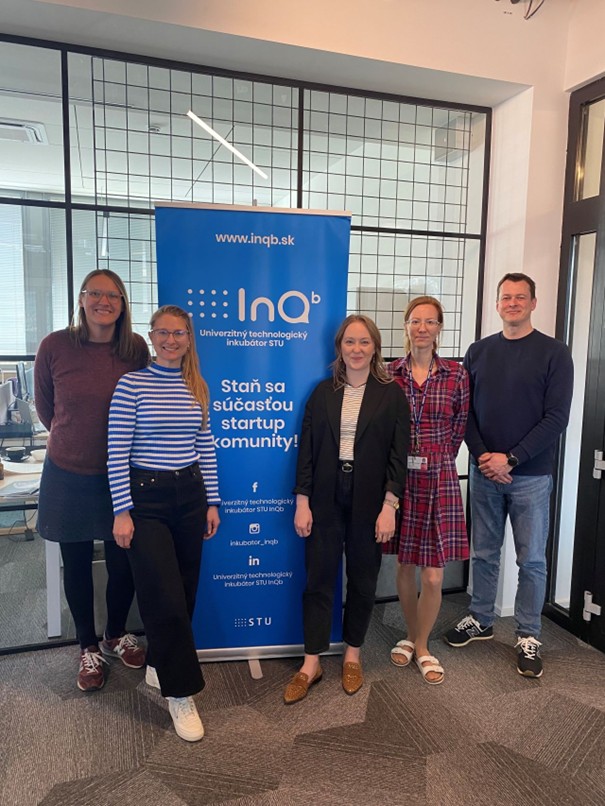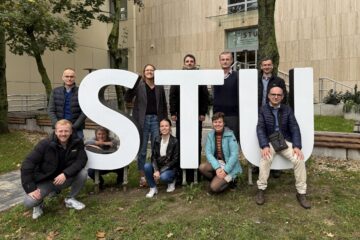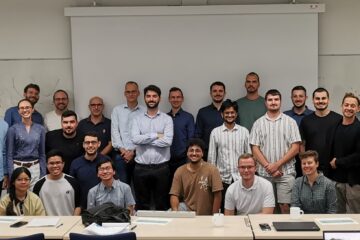In April 2025 the WORLDFACTORY Start-up Centre (WSC) of Ruhr University Bochum (RUB) embarked on an inspiring exchange visit to the Slovak University of Technology in Bratislava (STU) and meet with the representatives from Centre of European Projects, Centre of Technology Transfer and University Technology Incubator (CEPSIT). Michelle Twardzik and Vanessa Vaughn represented WSC in this best-practice exchange aimed at strengthening university-based innovation and entrepreneurship.

But this visit was about more than institutional knowledge-sharing – it was a dynamic opportunity to experience an innovation culture, explore mutual challenges, and spark ideas for future collaboration.
During the meeting many aspects were discussed, but there are the main areas:
Building a Culture of Innovation
STU is in the early stages of embedding transfer and entrepreneurship into its core institutional strategy. The university is rapidly developing a supportive ecosystem, including a startup program, an industry advisory board, business developers, and tech scouts. Their approach to incentivizing technical mentorship sparked valuable reflections for the RUB team on how to refine their own support mechanisms for science-based startups.
A Shared Industrial Heritage
Germany and Slovakia share more than just a commitment to innovation—they both boast strong industrial and manufacturing sectors. This common ground opens exciting avenues for collaboration, particularly in fields like engineering, industrial technology, and digital transformation. For science-based startups operating at this intersection, the potential for cross-border synergies is strong.
From Smart Labs to Sweet Spots
The exchange was not confined to formal meetings. The RUB team explored the newly opened space of the University Technology Incubator, featuring modern coworking spaces. The surrounding area—filled with cozy cafés and vibrant restaurants—created an atmosphere that blended creativity and collaboration, reinforcing the idea that place matters in fostering innovation.
Infrastructure as a Catalyst
One of the key takeaways was the importance of physical infrastructure for deep tech startups. Access to prototyping labs, makerspaces, and technical resources is crucial to turn research into real-world impact. Both institutions acknowledged this as a shared priority, recognizing that such infrastructure is foundational for thriving science-based entrepreneurship.
Exchange Goes Both Ways
The visit was a two-way street of ideas and inspiration. STU’s strategies to deepen industry collaboration—through dedicated business development roles and formats that bring researchers and companies together—provided valuable insights. In turn, WSC shared its experience developing a robust transfer mission, shaping IP policies, and fostering an entrepreneurial mindset within academia.
The two teams also explored opportunities for joint funding, exchanged lessons learned, and candidly discussed shared challenges—especially how to engage more researchers in the entrepreneurial journey.
A special thanks goes to Martin Mönnigmann (RUB) for facilitating this connection and to Viltarė Platzner (STU) for hosting the exchange.
The teams left Bratislava energized, full of fresh ideas, and eager to see where future collaboration could lead. Those working on similar initiatives in university entrepreneurship and technology transfer are warmly invited to connect—because building bridges is how innovation grows.
The text was written by Vanessa Vaughn and Viltare Platzner. Photo Vanessa Vaughn
This project has received funding from the European Union’s Horizon under grant no. 101079342 (Fostering Opportunities Towards Slovak Excellence in Advanced Control for Smart Industries).





0 Comments